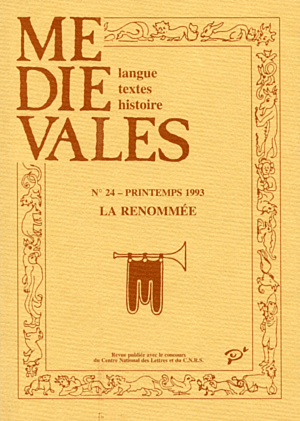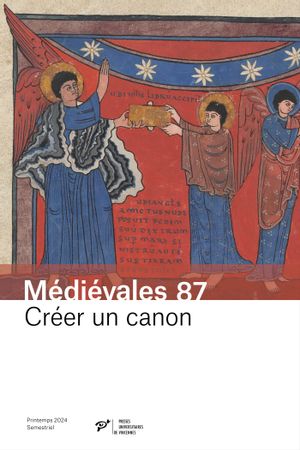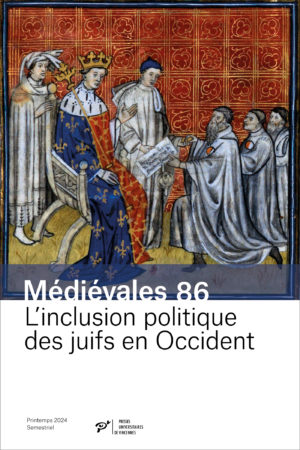Claude GAUVARD
Fama, the Founding Word
The introduction examines the dual aspect of renown which, in the late Middle Ages, is understood in terms of rumor as well as reputation. Rumor is most often a deformation which feeds on the collective fear of an uninformed opinion. Spreading by clichés, it serves to enlighten the reputation which is ensured by the members of the community – the witnesses – but also by minstrels and poets who detain the magic of the world. The question is to perceive how theses judgments relate to the given conditions of the social status acquired by birth. The opposition between nobles and non-nobles becomes essential. In either case, the world is the foundation, but whereas for the nobles it ensures their renown, for the non-nobles, it creates their status.
Anne GRONDEUX
The Latin Vocabulary for Fame in the Middle Ages
Gloria, fama, “honor” and “glory” : these four words must be considered in their relationship to each other. Gloria seems to be reserved for God, whereas fama relates rather to human beings. But Gloria and laus are both a sign of recognition and acknowledgement by the user of a person’s or a thing’s being gloriosus (God, a saint, a church) or famosus (a warrior, a master).
Jean-Pierre NERAUDAU
Fama in Ancient Rome
The Fama in ancient Roman has been analysed since Varron as the minimal degree of the world : rumor which does not proceed from reasoning. The development of nobilitas with its innate meanings of gloria and of laus, and the confrontations of civil war, have influenced the evolution of Fama, Virgil’s winged and evil monster. The coming of the new imperial order then transformed the political term, which assumed a judicial or laudatory significance, while the popular Fama was reduced to mere hearsay.
Jacqueline CERQUIGLINI-TOULET
Fama and the knights. Name and Fame at the End of the Middle Ages
This essay examines the new relation created at the end of the Middle Ages by the following three terms : renown, memory, and writing. Basing herself on the importance of the lists of names that present simultaneously lists of fame, the author focusses on nine knights in particular, and on nine muses, as well as on the play between these related lists. The author thus shows that literary fame can become a possible substitute for nobility of birth. This is clearly indicated by the literary tombs of writers in French. The author finds evidence for the above statements in the mutation of sensibility demonstrated in the change that the allegory of fame undergoes. Fama passes from the figure of a bird (which harks back to the aesthetics of the voice), to the figure of the horse : hence, Pegasus, an image that designates this new insistence advocated by the aesthetics if the imprint, and ultimately of the writing.
Gilles ROQUES
Reputation in the Medieval French Language : Outline of an Onomasiological Glossary of Middle French
The glossary of Middle French presented here comprises terms illustrating the actual concept of reputation with its dual meaning of “honorability” and of “notoriety”, that is to say, honneur, gloire, fame, los, bruit, renommée. Gloire is opposed to honneur in the way that heaven is opposed to earth, while the term los emanates from decisions taken by the community. Los, having become archaic, is replaced by cri, then bruit. Lastly, renommée, having taken the feminine gender, designates the synthesis of bruit and of the ancient fame, preparing the way for the modern réputation.
A. PORTEAU-BITKER, A. TALAZAC-LAURENT
Fame or fama in the Criminal Secular Law of the XIIIth and XIVth centuries
In this paper our purpose is to give the jurist’s opinion on the notion of fama in the criminal secular law of the Middle Ages, and particularly in the criminal proceedings of the XIIIth and XIVth centuries. In this period of evolving judiciary procedures the French term “renommée” or the Latin one “fama” encompassed two very similar ideas : First, the idea of rumor as a starting point of a prosecution. In the accusatory as well as in the inquisitory proceedings, when it was known that a felony has been committed, the judge could interpose, even though his action remained very limited in the accusatory proceeding. Then, the idea of reputation, that is to say the general feeling about the accused, the victim, or both, or even the witnesses. Thus, in both proceedings, the fama as public opinion about a person was considered in every phase of the process even until granting. Furthermore, the good or bad reputation of the parties was very often the key to the case. As a result of our study it appears that the concept of fama was very frequently used in criminal law. This may be explained by two factors : the growing interest of a more independant society on the one hand, a means of compensation for the relative weakness of criminal justice on the other.
Christiane KLAPISCH-ZUBER
The Honor of the Noble, the Fame of the Mighty. The Definition of the Italian Magnates (1280-1400)
In Northern Italy and especially in Florence, during the last decades of the XIIIth century, some families among the urban nobility were distinguished from the others. They constituted a particular juridical and political group, the “magnates”. In order to designate them and apply to them specific law procedures, Italian communes widely used the notion of “fama publica” ; an ambiguous notion, however, since in the case of the magnates it referred at the same time to their violent conduct and disturbance of the peace, as well as to their honour or other highly praised aristocratic values. Their subsequent reintegration into the political body during the late XIVth century could still be referred to their reputation – that of peaceful conduct and merchant honorability. Moreover, magnates reentering the class of the common people quite cleverly insinuated that their history during the past century had always been one of constant loyalty and knightly service to the Commune.
Nicole PONS
From the Renown of the Kingdom to the Honour of France
In 1420, an anonymous author defied the appropriation of the kingdom of France by the English by invoking the “honour of the crown of France “, for which the inhabitants of the kingdoms must be prepared to die if necessary. Praise celebrating the crown customarily included the following elements : the excellence of the royal lineage, the religious orthodoxy and virtues of its subjects, and the advantages provided by the geographical situations of the kingdom. In these conditions, honour, even though crucial, was only one attribute among others. However, as a new concept, the personification of France (together with its corollary, the personification of the crown) began evolving in the mid-fourteenth century : honour became the key value, associated not with the individual, but with the kingdom itself. In this manner, the notion of renown evolved almost imperceptibly into that of honour.
Jean-Marc CHATELAIN
The Political Framework of Fame from Erasmus to Lipsius (1530-1570)
The Respublica literaria is considered in the 16th century as an ideal form of political organisation, similar to that of an ancient city. Thus a scholar’s fame is linked to an idea of justice and a view to the common interest (utilitas publica). As is shown in Erasmus’s correspondence, the great renown of the scholar depends on his degree of involvement in the common interest and the concordia in the Respublica literaria : this is what gives him the good reputation which might turn into glory, that of being called Princeps in optimis litteris. In Justus Lipsiu’s works, this hierarchical representation from good reputation to glory does not apply only to the Respublica literaria but to the contemporary political society as well : the idea of concordia, which refers to Cicero, is used to assert the moral and political superiority of the prominent citizen’s reputation over that of the great commander.
Nathalie BOULOUX
The Uses of Geography at the Plantagenet Court in the Second Half of the Twelfth Century
The literary and historical works of the Plantagenet Court during the second half of the Twelfth century were largely influenced by geographical lore. There are three reasons for this. The cultural renaissance of the Twelfth century brought about the imitation of antiquity, notably through the use of geographical changes. The court offered writers an interested public, avid of knowledge about the imago mundi : romances gave a traditional view of its marvels, while legends circulating at court sometimes echoed more intellectual considerations. Finally, the expanding power of the Plantagenets offered scholars new subjects to write about – a description of Ireland, for instance, or maritime routes followed by the English fleet during the Third Crusade – and directed the attention of scholars towards the need to study space. For example, Gerald of Wales reflected on the nature of Ireland, whose remoteness made it a world apart. A better knowledge of geography also served to glorify royal power, as the use of the symbol of the mappamundi as a representation of the power of the prince, testifies. Thus, a cultural reconaissance and service to the Prince, within the framework of the court, account for a geographical progress remarkable for an exceptional number of works as well as for their importance.
Paul MIRONNEAU
Gaston Fébus and Fortune
A short extract from the chronicle of Aymeric de Peyrac, abbot of Moissac (1377-1406), provides new insight into the life of Gaston Fébus, count of Foix. Although Froissart and most other historians described him as a noble and courteous man, Aymeric insisted on the avarice, selfishness and hypocrisy of the count. This negative and reproachful point of view attest to the fact that other writers also conjectured that certain deeds pay have benn imputable to the count. But in Aymeric’s opinion there is no doubt whatsoever concerning the murder of Gaston Fébus’s son, for instance, or the accusation of sorcery. Linked to the Armagnac clan, the writer’s judgement was above all moral and political ; he expounded on Fortune and death on an elevated literary level, serving to promote the figure of King Charles VI as a model. Among princes, chivalrous nobles like the Black Prince, or Jean d’Armagnac, Fébus’s rival, were set apart, despite their failures, from the cynical princes, who refused the counsel of the Church and neglected the peace and well-being of their subjects.






